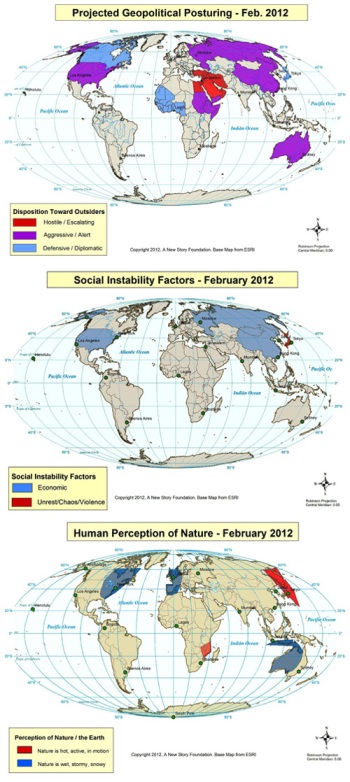An earthquake in Japan. Instability in the Middle East and Persian Gulf. Economic turmoil. Global unrest.
When events like this occur around the globe, the first reaction is often “how come no one saw this coming.”
 For Dr. Cari Bourette, a WKU adjunct professor and co-founder of A New Story Foundation, the first reaction is “well, we saw it but nobody listened to us.”
For Dr. Cari Bourette, a WKU adjunct professor and co-founder of A New Story Foundation, the first reaction is “well, we saw it but nobody listened to us.”
Over the past six years, combining her experience from a psychology background with the field of geography, Dr. Bourette has developed The MoodCompass, a methodology to track and map mood and perception on a global scale to forecast near future periods of socioeconomic, geopolitical or environmental instability.
“We don’t forecast events,” she said. “We forecast social mood and perceptions.”
Dr. Bourette, a graduate of WKU’s geoscience master’s degree program, collects information surrounding current global events as portrayed in the media and then qualitatively assesses eight mood factors. These factors have been observed to oscillate in fairly regular patterns over time, which allows a near future cycle to be estimated. They form configuration patterns that coincide with changes in behavior on a societal or even global scale as indicated by the markets, civil unrest, geopolitical posturing, and even significant natural events.
In February 2011, Dr. Bourette, assisted by several students in WKU’s Department of Geography and Geology, analyzed human perception of nature for the month of March and noticed the possibility of a significant natural event surrounding Northern Japan. The group produced a video alert on YouTube cautioning travelers to East Asia and warning against eating the food from that region “until more is known about this event.” On March 11, an earthquake and tsunami struck Japan.
“This seems to be cutting-edge research,” Dr. Bourette said. “We’re on to something profound and are learning a new science.”
On the recent geopolitical scene, while some were postulating on an Israeli strike on Iran, Dr. Bourette and her team issued an alert of an escalation in the Persian Gulf in the month of December. According to blog posts and video alerts, the most likely scenario was a “naval buildup or blockade” within the Gulf itself and an Israeli strike on Iran “was highly unlikely.” A U.S. drone was captured by Iran in early December, and Iranian military exercises began on Dec. 24.
So what’s ahead for 2012? Dr. Bourette offers general impressions of collective mood and perception on her blog, The Crow’s Nest, and notes “those who are looking for 2012 to mark the ‘End of the World’ may be disappointed. 2013 is likely to show up on schedule.”
Dr. Bourette sees the next few months as “action-packed” on many fronts, with observable increases in instability in all three areas she and her team are involved with: socioeconomic, geopolitical and natural events.
In addition to global unrest, instability and resource scarcity, Dr. Bourette’s analysis forecasts a new level of unrest in the United States.
“If you find it being too much,” she notes on her blog, “turn off the news and watch a movie, one of the Hollywood type. You won’t miss anything, really. There’s always 2013.”
However, there may not be a 2013 – or even much of 2012 – for The MoodCompass and A New Story Foundation. “Our group is at a crossroads,” Dr. Bourette said. “We don’t know what’s next.”
Dr. Bourette and her group are hoping they’ll find the resources to continue their work and to provide opportunities for WKU students. “But in an economic downturn, many are feeling the pinch of tight budgets,” she said. “As promising as this cutting-edge research might be, A New Story Foundation is considering closing its doors due to lack of funding.”
Contact: Dr. Cari Bourette, (270) 392-0904 or cari@anewstory.org

